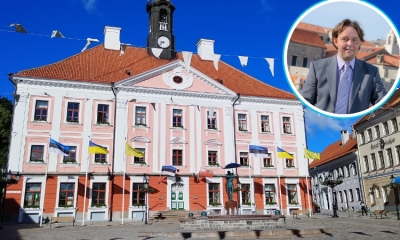Last week was full of firsts for me: my first visit to the Baltics, my first visit to the northernmost place on Earth, my first visit to Scandinavia, my first time trying rhubarb wine.
I escaped the scorching heat and chilled myself to the bone in this 20 degree paradise on earth. The Dalai Lama once said, “Once a year, go somewhere you’ve never been before,” and I certainly did.
“Is Estonia what you imagined it to be?” asked one of our hosts as we sat in a traditional restaurant in Tartu on the last day of our four-day trip. Though I had done a bit of research, I was half expecting a Soviet-style country with dreary architecture and boring features, still trying to escape the claws of Communism. I was wrong, totally wrong!
The reason I visited Estonia, or more precisely Tartu, the European Capital of Culture 2024, was for an EU project on digitalisation and remote working, and in fact I was to host a podcast.
You may not know this, but Estonia is right at the cutting edge of digital life.
And this was especially evident during the two-hour bus ride from Tallinn to Tartu, when sitting across from me was a couple in their mid-70s who were surfing the web, video calling, and chatting on their smartphones the entire trip.
Estonia seems to have started on the digitalization path 20 years ago, and we literally live and work online. “Almost everyone in the city council works remotely,” the Deputy Mayor explained. In fact, three points really fascinated me: digital transformation, an eco-friendly and sustainable lifestyle, and a focus on mental health. And all these points are handled brilliantly.
Now I enjoy the cultural shock – life would be boring if everyone was the same everywhere – but one thing that took me quite some time to get used to was the sun, or rather, the sun that rarely sets.
“It’s going to be three very long months,” one local resident said.
We left the restaurant at 10pm, just as it was closing, and walked outside into the bright sunshine, where kids were playing on scooters and families were out walking. We were exhausted and didn’t understand why it was still light out. Dusk lasted a long time, almost coinciding with dawn, and there was total darkness from 11pm until around 3:30am.
Of course, the downside is that there are almost always power outages in the winter.
Estonians are making the most of these three months of sunshine (to the max). The group from Dubrovnik were bundled up, while the locals were in just shorts and t-shirts.
One afternoon the skies opened up and a torrential downpour fell, but locals walked around without umbrellas, drenched but smiling, their Viking blood seeping through. “How hot is it in Dubrovnik?” asked my local host, surprised when I replied mid-30s. “About the same as our sauna,” she smiled.
We can’t stress this enough: Estonians love saunas.
“We even have a sauna in our office,” the young woman added. I’ve never met anyone who doesn’t go to the sauna at least once a week, and many who go four or five days a week. “We go every Sunday with our whole family,” said another local.
I quickly discovered that saunas are social events where people gather with family and friends to enjoy food and wine, and it seems common to go into the sauna completely naked to deepen that “bonding” experience.
And during my travels, I look for local delicacies. “You guys make wine?” I asked. “Well, not from grapes, but from other fruits,” she replied. And one of those fruits is rhubarb. Strange but true.
For three days, I kept asking if I could sample this unique drink, and on the final day, one of the organizers showed up to the meeting with a chilled bottle, which, diplomatically speaking, was a unique taste.
But in all fairness, my experience in Estonia was far from what I expected: a country that is in many ways far ahead of major European countries, yet still little known about.
Estonia – We will be back.
Read more British in Dubrovnik… well, if you really want to
—————————————————————————————————————-
About the Author
Mark Thomas (aka Englez u Dubrovniku) is the editor of the Dubrovnik Times. He was born and raised in England and moved to Dubrovnik in 1998. He has worked in a variety of media, from a daily radio show to television and print. Thomas is fluent in Croatian and his column can be read on the Croatian website Dubrovnik Vjesnik.


